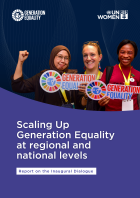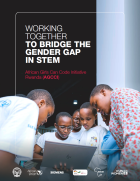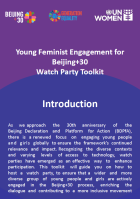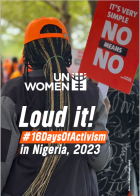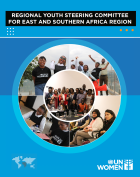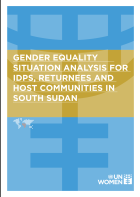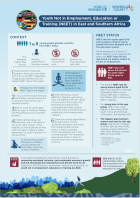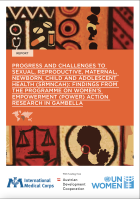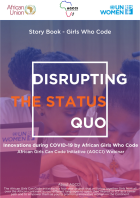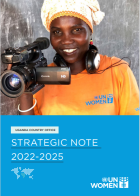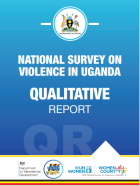1 - 20 of 23 Results
Pagination
Date:
This report summarizes the discussions, outcomes, and recommendations from the Generation Equality Dialogues “Advancing Generation Equality Through Local Action: Scaling up Generation Equality at national and regional levels” held on September 12, 2024.
Date:
This report showcases the transformative journey that the AGCCI alumni in Rwanda have embarked on, paving way to becoming the innovators and change makers of the present and future.
Date:
The Beijing Declaration and Platform for Action (BDPfA) is a landmark global commitment, adopted by 189 countries in 1995, to advance gender equality, eliminate discrimination, and empower all women and girls.
Date:
The UN Women Kenya Annual Report highlights key achievements in advancing women’s empowerment and gender equality.
This report showcases progress in increasing women’s leadership and political participation, strengthening economic empowerment, eliminating violence against women and girls, engaging women in peace and security efforts, and enhancing planning and coordination.
UN Women Kenya remains dedicated to building a future where women are at the heart of developing resilient and sustainable communities.
Date:
Under the leadership of the Ministry of Gender, Child, and Social Welfare, in collaboration with the Ministry of Peace Building, and with support from UN Women and international funding, the Women’s Charter empowers women and girls to engage with the Reconstituted National Constitutional Review Commission (R-NCRC). Launched on May 29, 2024, in Juba, the Charter addresses twelve critical themes, advocating for comprehensive legal, policy, and programmatic interventions in the Permanent Constitution-making process.
Date:
This Regional Coordination Strategy articulates how UN Women will leverage its unique triple mandate—encompassing normative support, UN system coordination, and operational activities—to mobilize urgent and sustained action to achieve gender equality and the empowerment of all women and girls and support the achievement of the 2030 Agenda.
Date:
This document gives an overview of the activities carried out during the 16 Days of activism 2023 Campaign in Nigeria.
Date:
In August 2023, UN Women East and Southern African Regional Office welcomed nine (9) youth gender advocates to serve in the Regional Youth Steering Committee (RYSC). The nine advocates, who responded to a call for expression of interest to join the Committee, were selected following a rigorous screening process undertaken by UN Women Regional Office for East and Southern Africa (ESA) in collaboration with UN Women Country Offices. The members are drawn from the East and Southern Africa Region and have diverse professional backgrounds with a strong orientation towards championing gender equality and the empowerment of women and girls.
Date:
As gaps remain in efforts to stem the tide of global economic crises, having fiscal policies in place to safeguard spending for women is essential. Gender Responsive Budgeting (GRB) can ensure a gender-equitable allocation of resources and expenditure tracking to promote gender equality. This briefing note provides information on the foundation established to determine entry points for this work, key partnerships, and plans to advance systemic financing for gender equality in the country.
Date:
The Report documents our work with communities and stakeholders to advance Gender Equality in Zimbabwe, the challenges, interventions and results achieved
Date:
This quarterly newsletter profiles UN Women Uganda activities and highlights voices of beneficiaries. The Q3 Newsletter covers the period of July to September 2022.
Enjoy the read!
Date:
Since the onset of the COVID-19 pandemic and associated worldwide economic decline, East and Southern Africa (ESA) has suffered job losses and an increase in poverty, interruptions in healthcare services, and declined nutrition levels. Young adults whose place in the labor market is often informal, temporary, and tenuous at best have suffered greater job and income losses than their parents.
As part of ensuring that recovery efforts also reduce the number of youth, young women, not in employment, education, or training (NEET), UN Women in ESA commissioned a quantitative study on the NEET status of youth aged 15-24 years in nine countries in the region.
This report summarizes country findings and provides detailed analysis of available NEET data for youth aged 15-24 years with a view to supporting evidence-based policy advocacy and action in this area. This study covers Botswana, Ethiopia, Kenya, Malawi, Mozambique, Namibia, Rwanda, South Africa, and Uganda.
Date:
UNWomen, in collaboration with International Medical Corps (IMC), has been implementing a Programme on Women’s Empowerment in Sexual, Reproductive, Maternal, Newborn, and Child and Adolescent Health (SRMNCAH) Rights (POWER) in humanitarian settings in Gambella Region. The purpose of the action research is to document the progress on the SRMNCAH programme implemented in the humanitarian setting, lessons learned from it, gaps in it and efforts required for it. The findings will better inform UN Women and partners working in a humanitarian setting on the current progress and the efforts required to improve SRMNCAH services in the refugee and host communities.
Date:
Innovations during COVID-19 by African Girls Who Code
Date:
Uganda has made gains in its socio-economic transformation, maintained peace and stability for over 3-decades and is on course to become an upper middle-income country by 2040. The Government of Uganda (GoU) is committed to the SDG 2030 Agenda as exemplified by the gross domestic product which doubled over the last 10-years, from $17.2 billion in 2010 to $34.4 billion in 2019. Literacy rates improved from 70% between 2012-2013 to 74% between 2016-2017, yet still literacy levels were higher for males than females. Uganda’s National Development Plan (NDP) III focuses on inclusive growth, human wellbeing and resilience, transformational and inclusive governance positions. The NDPIII is a convergence framework for the entire UN System to coherently contribute to the advancement of Gender Equality and Women’s Empowerment (GEWE) in Uganda with UN Women as a strategic partner on the path to transformation
Date:
The qualitative component of the Women’s Health and Life Experiences study was designed to complement the larger survey on prevalence which seeks to generate reliable estimates of the prevalence of different forms of Violence Against Women and girls (VAWG), provide detailed information on the impacts of VAWG, and examine women’s attitudes to violence, how women cope with violence, and the risk factors associated with VAWG. It provides contextual information on women and community perspectives and experiences of Violence against women and girls (VAWG).
Date:
The transition to a green economy will create many new jobs around the world, including in sub-Saharan Africa. But will women share-in these new jobs, and will the economic transformation help them move into higher-paid, more stable jobs that require more education and skills? The short answer is “yes” – provided countries adopt strong policies and programmes to make it happen. The green economy transition is attracting attention in policy circles but its potential gender...
Date:
This report highlights UN Women Nigeria’s work for the year 2020. The report builds around the Nigeria Country Office programmatic areas of intervention and reflects the achievements attained in collaboration with various government and non-governmental partners who contributed to policy advocacy efforts, delivery of services, implementation, and funding of interventions aimed at promoting gender equality and women’s empowerment. The population at large (men, women, boys...
Date:
The publication aims to provide information that helps prepare the youth for an inclusive, environment sensitive, and resilient approach to productive livelihoods.
Date:
The UN Women Tanzania study involved desk review, key informant interviews with the government and CSOs, an analysis of the literature of relevant laws and policies on customary practices as well as a review of land governance and land administration practices in Tanzania was done in August 2017. The study also highlights recommendations to advance women's land rights and tenure security in the context of SDGs.

